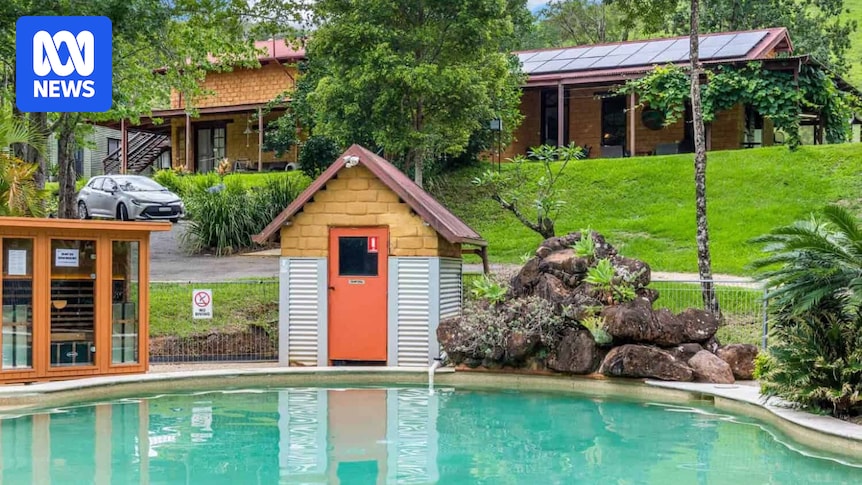Medical student Gordon Nguyen knows he’s lived a relatively sheltered life when it comes to substance abuse.
“I don’t really have a background in addiction — I’ve never really been affected by it,” he said.
So when he spent six weeks at a rehabilitation clinic as part of his medical degree, the 24-year-old had an “eye-opening” experience.
“It’s not just the medical side, like the drug — addiction is more of a symptom of something else,” he said.
“That’s something that the books don’t really mention.”
As part of his Bond University studies, Mr Nguyen lived at the Gunnebah Addiction Retreat for a six-week program aimed at challenging the misconceptions medical students may have about addiction.
While the goal is to help students better identify and treat patients struggling with substance abuse, it requires “a different version of healthcare delivery”, according to an addiction therapist.
The private retreat is in northern New South Wales. (Supplied: Gunnenbah Addiction Retreat)
Addiction beyond a clinical setting
Gunnebah is a private facility, deep in the northern New South Wales hinterland, which houses about 20 guests.
“I saw pretty much anyone who was affected by addiction — working professionals, as well as just blue-collar workers, there was a lawyer, a nurse,” Mr Nguyen said.
“I’ve never seen that before, it was quite confronting actually to see anyone could be affected by addiction.”
He worked under general practitioner Jennifer Parer, who co-founded Gunnebah eight years ago.
“[The students] haven’t really dealt with people with addiction before, and the only thing they’ve ever heard at uni is, ‘Beware of the drug-seeking addict’,” Dr Parer said.
“But working in this addiction space, when you hear the stories these people have been through, and they’re still here — it’s heartbreaking.”
Dr Parer said by living on site for part of their placement, the students spent time with the guests outside of a clinical setting.
Jennifer Parer says Gunnebah creates a space to heal. (ABC Gold Coast: Dominic Cansdale)
“It’s not just counselling, it’s not just medication, it’s also making sure they’re eating well, the importance of exercise,” she said.
“A lot of patients in the addiction area are really isolated and lonely — they’ve burned a lot of family and friends and so reconnecting in society is really, really important.”
The students learn how to recognise if “someone is in an addiction struggle”. (Supplied: Gunnebah Addiction Retreat )
Not a ‘typical addict’
Robert, who asked to remain anonymous, hopes his story challenges addiction’s stigma.
He maintained a successful career while abusing substances for three decades.
“I had some pretty high end management and corporate jobs over my time where drinking was part of the culture,” he said.
Most of the guests at Gunnebah have experienced alcohol addiction. (ABC News: Dane Meale)
“But I never thought I was an addict because I managed to brush my teeth, have a shower everyday and pay my bills.
“My dad was a poster boy for addiction, he never looked after me, he was a petty crim, a drug dealer — he was what a typical addict looked like, I wasn’t.”
But Robert eventually admitted himself into Gunnebah after his addiction became so bad he lost his business and custody of his children.
“I felt a lot of shame and guilt that I had gotten that far, [but] was desperate for help at the same time,” he said.
Robert said 22 months later, he had learned “not just how to live without drugs but to learn why I took them in the first place”.
“People don’t understand the journey that it is and how much work it is,” he said.
“That needs to be given compassion, love and respect and dignity.”
Empathy with boundaries
Addiction therapist Judith Magee said it was important for students to have empathy for the underlying causes of addiction while maintaining professional boundaries.
“It can be a very intense space,” she said.
“You’re commonly working with a very marginalised [group of people], generally speaking, a lot of trauma.
Judith Magee says Gunnebah is teaching medical students to think more openly about addiction. (ABC Gold Coast: Dominic Cansdale)
“You’re needing to make sure you’re really in the best place you can be personally to show up so you can do really good, clear-thinking balanced work.”
Ms Magee said many people would hide their addiction from their doctor, meaning its impact on other health issues could be “completely missed”.
Students have been learning how to “recognise someone who is in an addiction struggle”.
“Many people who’ve had complexities with addiction and mental health, have experienced a lot of judgement, so they’re very guarded,” Ms Magee said.
Loading…
‘A ripple effect’
Ms Magee said students had been “experiencing such a different version of healthcare delivery” to what they might see in the public system, where they may be dealing with more acute situations.
She said she hoped the program could “meaningfully dispel the problematic myth that addiction was just about people not getting their s**t together”.
Dr Parer said working in the addiction field had been the “most rewarding thing she had ever done” as a doctor.
“It’s a ripple effect — getting them back into the workforce, getting them back to being a father, being a mother,” she said.
Gordon Nguyen says he has developed a deeper understanding of addiction. (ABC Gold Coast: Dominic Cansdale)
As his studies continued, Mr Nguyen said he aimed to take his experience in addiction treatment to other medical fields.
“A lot of the mental health issues happen when you’re a kid [and] addiction can be a pathway to cope with their situation,” he said.
“Trying to support children when they’re young so they don’t resort to that path is something I really want to incorporate in my career.”
Outdoor facilities at the drug rehabilitation centre. (Supplied: Gunnebah Addiction Retreat)
